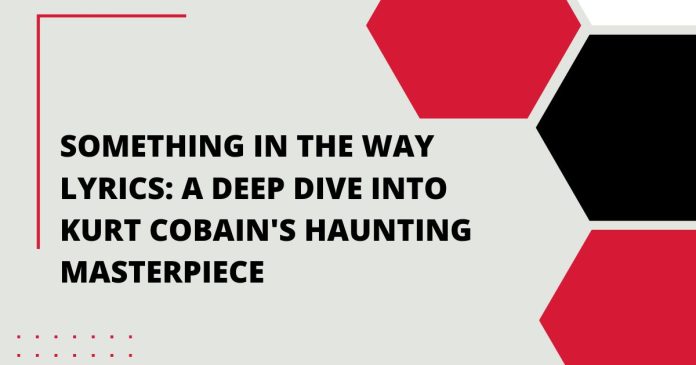In the annals of rock music history, few songs have left as indelible a mark as “Something in the Way” by Nirvana. This hauntingly beautiful track, penned by the enigmatic Kurt Cobain, has resonated with listeners for decades. In this article, we’ll embark on a lyrical journey, dissecting the profound “Something in the Way Lyrics” and exploring the emotions, meanings, and hidden gems that lie beneath the surface.
The Genesis of a Masterpiece
Kurt Cobain’s life was a tapestry of emotions, and “Something in the Way” reflects the depths of his struggles. Born in Aberdeen, Washington, Cobain’s tumultuous upbringing profoundly influenced his songwriting. The song emerged from his experiences of being homeless and living beneath a bridge in his hometown.
Unpacking the Lyrics
Verse 1: “Underneath the Bridge”
The opening verse, “Underneath the bridge, tarp has sprung a leak,” paints a vivid image of despair and isolation. It’s a metaphor for Cobain’s own feelings of desolation and hopelessness. The leaky tarp symbolizes the emotional turmoil that threatens to drown him.
Chorus: “Something in the Way, Yeah”
The chorus is an emotional outcry. Cobain’s mournful repetition of “Something in the way, yeah” captures the inexpressible pain he felt. It’s as if he’s grappling with an intangible force that’s pushing him down.
Verse 2: “Each Night, Warms Away”
The second verse delves deeper into Cobain’s struggle with homelessness. “Each night, warms away” conveys the idea of seeking solace in the fleeting warmth of temporary shelters. It’s a poignant reminder of how fragile his existence was.
Bridge: “Don’t Have a Gun”
The bridge, with its haunting plea, “Don’t have a gun,” sheds light on Cobain’s inner demons. His battle with addiction and mental health issues is well-documented. This line reflects his cry for help, a desperate wish to escape the darkness that enveloped him.
The Legacy of “Something in the Way”
“Something in the Way” isn’t just a song; it’s an emotional rollercoaster that invites listeners to delve into Cobain’s psyche. Its enduring legacy lies in its ability to evoke empathy and introspection. Even decades after its release, the song continues to strike a chord with those grappling with their own demons.
Conclusion
In “Something in the Way,” Kurt Cobain gifted the world a haunting masterpiece that transcends time. Its lyrics, born from the depths of despair, resonate with anyone who has felt lost or alone. As we listen, we glimpse into Cobain’s tormented soul, and in doing so, we find solace in the shared human experience of pain, hope, and redemption.
FAQs
1. What inspired Kurt Cobain to write “Something in the Way”?
Kurt Cobain’s experiences of homelessness and despair in his hometown of Aberdeen, Washington, served as the primary inspiration for this haunting track.
2. What is the significance of the repeated line, “Something in the way, yeah”?
The repetition of this line conveys the inexpressible pain and emotional turmoil that Kurt Cobain felt, emphasizing the weight of his struggles.
3. How did “Something in the Way” contribute to Nirvana’s legacy?
The song added depth to Nirvana’s discography, showcasing their ability to create emotionally charged music that resonated with a global audience.
4. What is the connection between the lyrics and Cobain’s personal life?
The lyrics of “Something in the Way” draw heavily from Cobain’s personal experiences, particularly his battles with homelessness and mental health issues.

